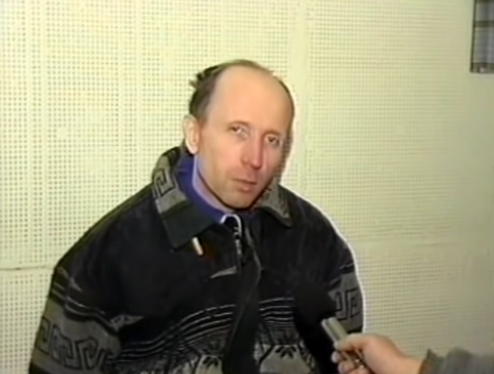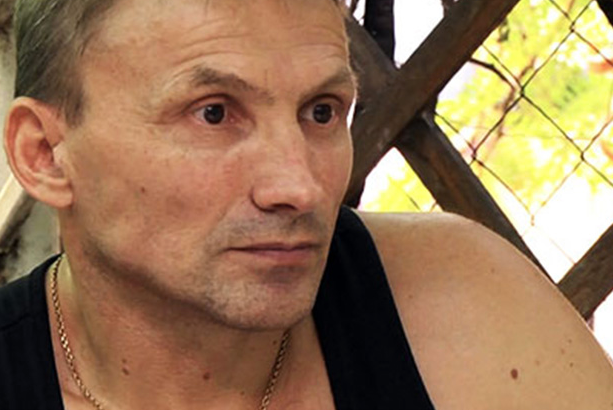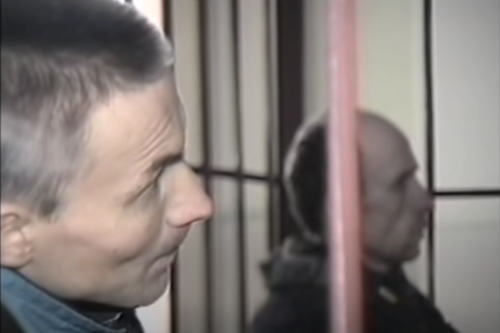https://www.programmedtokill.net/anatoly-onoprienko

In March 1996, the Security Service of Ukraine (SBU) and Public Prosecutor's Office specialists detained 26-year-old Yury Mozola as a suspect of the several brutal murders. Over the course of three days, six SBU members and one representative of Public Prosecutor's Office tortured (burning, electric shocking and beating) the arrested citizen. Mozola refused to confess to the crimes and died during the torture. Seven responsible for the death were sentenced to prison terms.
According to the lawyer of Onoprienko, there was another episode in 1989. Then, trying to solve one of the murders committed (the investigation, according to the lawyer, was especially active, since the victims were foreign citizens), the police detained two drug addicts - a man and a woman. “These unfortunate people were so diligently “convinced” of the need to admit that one seemed to hang himself in prison, and the second died in the hospital. There is no one to judge, but it was possible to report that the crime was uncovered,” he said. “The materials on assignment of the next officer ranks to especially distinguished policemen were also attached to the case materials ...”
Onoprienko was sent for interrogation, where he was charged with 40 murders. The investigator Bogdan Teslya, who conducted the survey, tells the following about what is happening:
First, he categorically denied any involvement in the murder, adhered to one version: that he lives in Yavorov with his friends, often travels abroad, and all the things he found in the apartment were bought by him. But during a long conversation he was often confused, one detail was also noted: wherever he was, born, worked, visited, it was there that the murders were committed.
He said he had derived no pleasure from the act of the killing. Corpses are ugly, he said. They stink and send out bad vibes. After I killed the family in the car, I sat in the car with their bodies for two hours not knowing what to do with them. The smell was unbearable.
The suspect told Teslya he was commanded by God to kill, and that he had been chosen as a superior specimen. He claimed he could wield strong hypnotic powers, control animals through telepathy and stop his heart with his mind.
Onoprienko revealed that he had previously spent time in a Kiev hospital for schizophrenia, a lead that Teslya was not allowed to pursue. The statement was interesting because immediately following the arrest, Kiev Interior Ministry investigator Alexander Tevashchenko said that Onoprienko – then identified as “Citizen O” – was an outpatient whose therapists knew he was a killer. Teslya later stated that he knew nothing about that side of the case, and the Kiev investigators have yet to release any further information regarding it since the initial statement.
There have been many rumors that he was part of a gang, but my feeling is that his discussions of his motives, and of his special powers, were not fabricated. I can be wrong, but that’s what I think, he said. Plus, just thinking rationally, I don’t think anyone but a single killer could have pulled off so many murders. In a gang, someone talks, another drinks, a third whispers something to a girlfriend, and it’s all over but as I say, I can be wrong.
The defendant claimed he felt like a robot driven for years by a dark force and argued that he should not be tried until authorities could determine the source. You are not able to take me as I am, he shouted at Judge Dmytro Lypsky. You do not see all the good I am going to do, and you will never understand me, he said. This is a great force that controls this hall as well. You will never understand this. Maybe only your grandchildren will understand.
“I’m not a maniac,” he said, without a hint of self-doubt. “If I were, I would have thrown myself onto you and killed you right here. No, it’s not that simple. I have been taken over by a higher force, something telepathic or cosmic, which drove me. “For instance, I wanted to kill my brother’s first wife, because I hated her. I really wanted to kill her, but I couldn’t because I had not received the order. I waited for it all the time, but it did not come. “I am like a rabbit in a laboratory. A part of an experiment to prove that man is capable of murdering and learning to live with his crimes. To show that I can cope, that I can stand anything, forget everything.” Onoprienko was adamant last week that he would not appeal to Kuchma to commute his sentence. Instead, he insisted that he should be executed. Suddenly animated, his speech quickened. “If I am ever let out, I will start killing again,” he said. “But this time it will be worse, 10 times worse. The urge is there. “Seize this chance because I am being groomed to serve Satan. After what I have learnt out there, I have no competitors in my field. And if I am not killed I will escape from this jail and the first thing I’ll do is find Kuchma (former Ukrainian president) and hang him from a tree by his testicles.”
“I feel like I’m cross between human and robot. Most of my work is supposed to be done by robots. I consider myself and experimenter. With myself and with other people.’’
According to him, all the killings were a kind of sacrifice: at first the maniac killed in order to fight “dying communism”, then - “neo-nationalism”. And Onoprienko wanted to bring another 300 murders to a certain "altar" to destroy the "plague of the 21st century."
He made statements about being allegedly recruited by the security services in the early 1980s and committed crimes according to their instructions (supposedly to “spread panic in a certain area”).
He claims he never thought of himself as an ordinary killer, he always felt as a top-surgeon. "When you see it like that, I'm a very unique person. I did things nobody else does. These all were unique events."
“I started preparing for prison life a long time ago -- I fasted, did yoga, I am not afraid of death,” he said. “Death for me is nothing. Naturally, I would prefer the death penalty. I have absolutely no interest in relations with people. I have betrayed them.

The Onoprienko case took 99 volumes. During the investigation, he extradited Sergei Rogozin, his accomplice in the first series of murders. Rogozin was arrested. At first, he denied involvement in the killings. Onoprienko himself later said that he regrets having betrayed a friend. He explained it this way:
The police insisted: you should have an accomplice. They needed an accomplice, they needed a gang, because when there is a gang, I’m still normal, sane. And when a loner - it’s easier for me to become a fool. Investigators told me specifically: look for the second. But Rogozin himself could go to the police, repent and tell how things were in 1989. I analyzed all the pros and cons and decided to name it myself.
Rogozin was a professional military man who served in Afghanistan, had a number of awards and headed the city council of internationalist warriors. Rogozin was married, he had a small daughter, he himself worked on a collective farm.

Unlike Onoprienko, Rogozin had a special, professional and well-paid lawyer, whose services were paid for by the relatives of the arrested person.
At first, Onoprienko pleaded guilty, and tried in every possible way to shield Rogozin.
In addition, Onoprienko demanded that the lawyer be replaced with “not younger than 50 years of age, Jewish or semi-Jewish by nationality, economically independent, with international practice”
But since Onoprienko did not have money for this, the court refused his request. After that, Onoprienko refused to testify.
Onoprienko’s accomplice in the first set of murders, 36-year-old Serhiy Rogozin, was sentenced to 13 years in prison.
The trial lasted 4 months. Onoprienko was 39 at the time of the verdict, Rogozin was 36 years old. Onoprienko himself later commented on the verdict:
People now do not value life, they are starting to throw out trifles of some kind of nationalistic, chauvinistic, fascist such surges. And in order to insert their brains, they must see all these horrors themselves: generals must see these horrors, politicians, then they will immediately feel like fighting ...
The verdict was greeted with applause from the audience. Onoprienko, while reading the verdict, showed the judge the middle finger, after hearing the verdict, drew a cross on his forehead.
Onoprienko behaved in a disciplined manner in jail, but sometimes howled at night, which terrified the people around him.
He reads a lot, was engaged in meditation and gymnastics. Onoprienko claimed to own a prophetic gift that was passed on to him from his grandmother (she was a fortuneteller)
Telling a reporter after his sentence: "To me it was like hunting. Hunting people down," "I would be sitting, bored, with nothing to do. And then suddenly this idea would get into my head. I would do everything to get it out of my mind, but I couldn't. It was stronger than me. So I would get in the car or catch a train and go out to kill."
Mikhail Zadoyany, 50-year-old retired head of the Ukrainian criminal police who organised the hunt for Onoprienko believes there is a religious theme to the last 40 murders.
Many took place on religious festivals like Christmas Eve, New Year's Eve and Orthodox Christmas Eve. Zadoyany says: "There is no proof that he did follow this pattern, but it is too much of a coincidence. So many of the murders were carried out on or around these religious days."
After his trial Onoprienki said: "I have never regretted anything and I don't regret anything now."
Still complaining of the conspiracies of higher powers and powers on earth out to murder humanity.
He said that during the investigation he said that he killed people for the purpose of robbery. "It's not true," said the serial killer.
Onoprienko said that he had committed nine murders since Soviet times. "I lived abroad with nine murders. I was baptized by Mormons, I was interrogated by the CIA, Interpol," he told reporters.
Onoprienko said: “When I committed murders, it was not my condition, it was inhuman. Maybe I had some influence. There are many forces on Earth that can affect a person. I myself would never go for such things. " "You can experiment with me, you can shock me, but find out why I committed murders," he added.
Onoprienko also stressed that he regrets what he did, but does not intend to ask for pardon. "I know it's bad. I won't ask for pardon. It would be better for me to shoot. It's important for me to know why it happened. Not to be released, but to find out," the killer added
The killer, who was called "The Terminator" died on August 27, 2013. A preliminary cause of death is a heart attack.
According to the prison service, the guard noticed that Onoprienko, who was being held in one of the cells of the sector for life-sentenced prisoners, was in a “fainting state.” Doctors tried to help the prisoner, but their efforts brought no results. The body of the deceased was sent for examination.
According to the chairman of the prison service Igor Andrushko, Onoprienko had "heart problems", recently he complained about his health. Although the journalists who visited the colony at the beginning of 2013, stated the opposite: according to them, Onoprienko has never been ill for all the time he spent 17 years in prison.
According to one of the prison guards, the thugs “tried to kill the thieves” several times earlier, but the guards prevented them (the guards did not provide details). There is no data available in the prison service that someone could be involved in his death.










"I lived abroad with nine murders. I was baptized by Mormons, I was interrogated by the CIA, Interpol"
Yeah, I archived something like that
http://news.bigmir.net/ukraine/744528-Ya-ne-znau-pochemy-ya-pochemy-52-ybiistva-Poslednee-intervu-Onoprienko
"Я жил за границей с девятью убийствами. Меня мормоны крестили, меня допрашивало ЦРУ, Интерпол", - заявил он журналистам"
ЦРУ=CIA
This is reminding me of Dostoyevsky's The Possessed. Highly recommended if you haven't read it